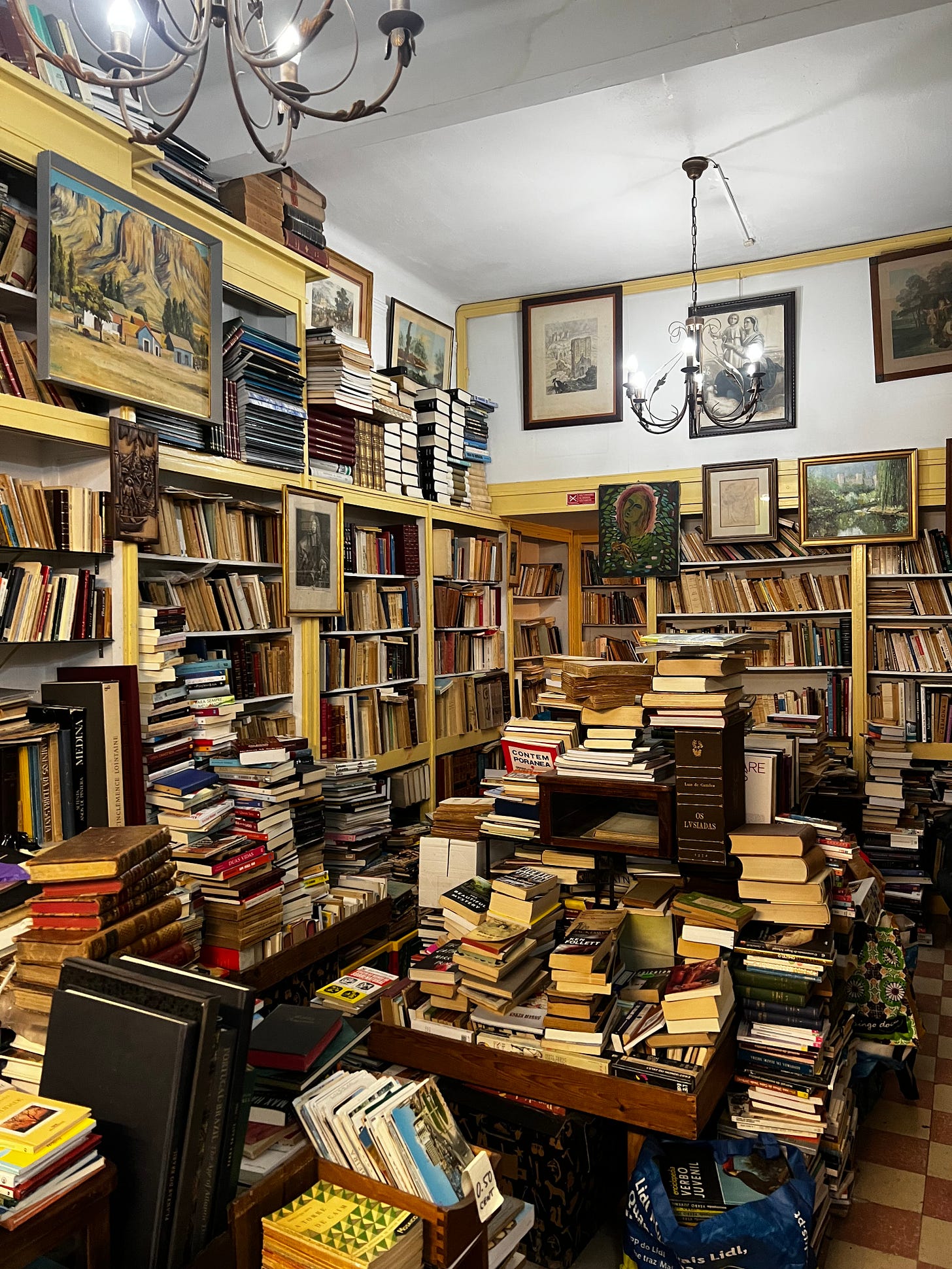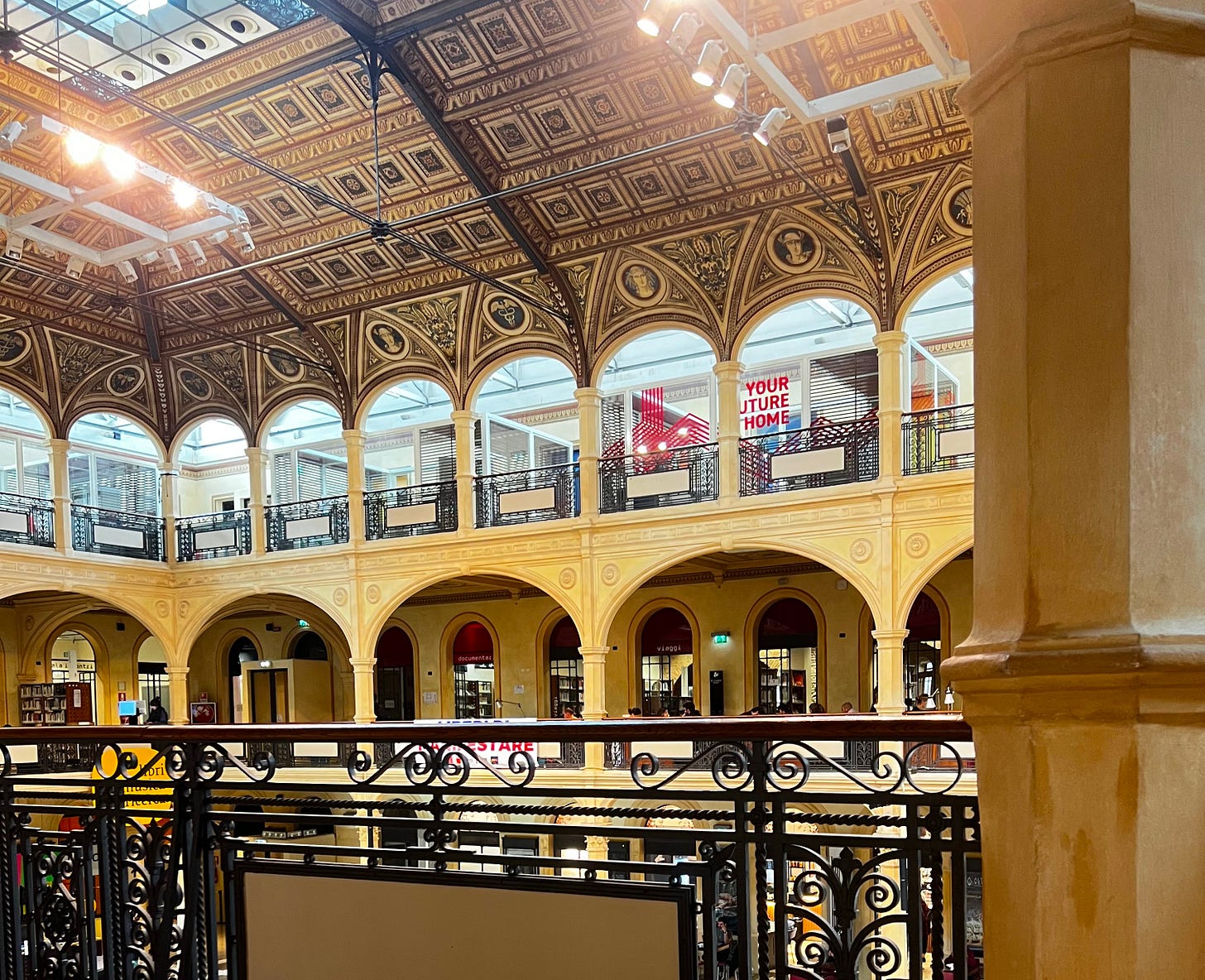002. whatever happened to public libraries?
Once a community staple, are public libraries fading—or just overdue for a comeback?
A couple of months ago I was chatting with a friend over the phone. I called her while I cleaned the kitchen after lunch and she was still wiping the sleep from her eyes. It’s 8:00 am in Toronto, Canada and our friendship has been relegated to FaceTime calls between meals and before class. I guess this is the price of long-distance friendships.
After the pleasantries, we jump into the important stuff; Premier Doug Ford’s plan to remove the bike lanes from Toronto, whether she has found a replacement for the now discontinued Givenchy setting powder, and if I am still on the hunt for a decent jar of peanut butter in Italy. To a layperson, it is confusing to understand how a conversation can sprout from one topic and grow many long intertwined branches into another, but that’s simply the nature of girl chat.
Somewhere between discussing global affairs and the latest influencer drama, she mentions that she went to the library and checked out a book she wanted to read. In this moment I realized I couldn’t remember the last time I had checked out a book from the library.
Like many kids who grew up in a city with nothing to do, our weekends were spent at the library. We conclude that it is very likely we had been in the same library at the same time as children but would only meet in high school.
I looked forward to Saturday afternoons at the library with my dad, anticipating what book I would discover after dropping last week’s literature down the book chute. While my Dad ventured to the basement level to consult books on investment properties or to surf the web, I entered my own domain; the kids section. Fun coloured carpets, plastic Ikea chairs, and an endless collection of Nancy Drew graphic novels; it was my intellectual oasis.
I could go on about the hours spent at my downtown public library, curled up in a bean bag chair with the latest issue of Junie B. Jones, but that would distract from the point: what happened to the public library?
I am very much aware they still exist (I am currently writing this from one in Bologna) but one cannot deny that with the rise of technology, the role of the public library has changed. Technology is way more accessible than it was 15 years ago, allowing for parents to be able to entertain their kids right at home. The invention of the iPad, on-demand television, and the fact that 94% of Canadians have internet access (2024, Statistics Canada) could all be reasons why public libraries are becoming forgotten.
Now, the public library I currently sit in is full of families, old men reading the current issue of La Repubblica, and stressed university students. Equipped with a caffé in case you need a coffee fix, I can say it puts my childhood public library to shame. But what is most impressive is that it is FULL. Italians (or at least those who come to Biblioteca Salaborsa) use the library as a community hub for all ages. There are language classes for newcomers to practice Italian, children story hour, and weekly conferences. So maybe the public library isn’t dead, or maybe the ones in Canada are?
I have seen online a growing concern for the lack of third places. First created by American sociologist Ray Oldenburg, it describes the places outside of the home (the first place) and the workplace (the second place) where people go to converse with others and connect with their community. No one is obligated to be there, and cost is not a barrier to entry. It is a meeting ground to build relationships and create connections. The most obvious third space in my life is a piazza, which comes alive after the working day is done. But upon reflection on my life growing up in Canada, the only one I can think of is the library.
If it is not obvious enough, I am pro-public library. It is a FREE space for people to have access to information in a world where life is increasingly becoming privatized. I just think the model needs to change. Gone are the days where people are checking out books, DVDs, CDs and VHS (I still love me a good VHS). Instead, public libraries should be places where parents can drop off kids after school to receive tutoring help, immigrants can access services to help them adjust to life in a new place, or the elderly can go to meet with friends. It should be accessible for all modes of transportation and with multiple locations across a city- including rural areas.
From my brief stint as a teacher, I see the need for public libraries more than ever. Schools are the first place you see the effects of the wealth gap. Parents are tasked with caring for both child and grandparent, class sizes have grown to 30, and over the last decade we have witnessed the shrinking of the middle class. Simply put, we are running out of road. Libraries cannot solve all these problems, but could be a good place to start.
The truth is, no matter what tax bracket you’re in - you’re free to use the library. A place for you to print a resume to get a job, practice public speaking skills, or learn how to code. Maybe you have a curious kid who wants to explore the world through stacks of books on the shelves or practice their art skills and become the next Picasso. Whoever it is and whatever their goal, the purpose of the modern public library model is to act as a vehicle for that.
Upon further research of my hometown’s library, I noticed that they are starting to implement some of the programming I see in Bologna’s library (unfortunately, not the cafe). But I think the issue lies in the fact that most people don’t know about it. For example, did you know
A library card is free
You can take out ebooks and audiobooks and download them on almost any device
You pay for it in your taxes
The pessimist in me fears that with the rise of the neoliberal agenda, the public library concept could be extinct. A place I considered my weekend paradise could be paved and turned into a parking lot (did you catch the song reference). But as I see the people flow in and out of Salaborsa, I am met with optimism for the future of the library.
I am sad to report that the conclusion of this cross-continental phone call did not end with us solving all the world’s problems. We couldn’t stop Doug Ford from removing bike lanes. My friend will still mourn the loss of her favourite makeup product, and I will continue to purchase every brand of peanut butter until I find one that remotely resembles the highly-processed, creamy goodness that sits on the shelves at your local Loblaws. But there are two things I took away from this conversation (and what I hope you will take away from this article).
The importance of preserving third places so that everyone in our community can benefit.
The library book you took out in 2007 and forgot to return; it’s probably overdue.





Public libraries are SOOOO overdue for a comeback
This is a naive and uninformed post. I'll speak from an American perspective but....Public libraries aren't being forgotten. Most are doing exactly what you suggest they do: diversify their programming and services, expand what constitutes circulating collections, offer access to more and more multimedia digital resources, etc etc. (Also analog media like books and DVDs are still being checked out. Not everyone has access to streaming services.) All this while funding is on the decline and the cost of everything is increasing, and the people who work in public libraries are being overworked, underpaid, while also being expected to basically operate as a social services staff. I am a lifelong patron of public libraries AND a librarian and so I appreciate the spirit of this post but I'm irked by the implication that "the model needs to change". It has changed, tremendously, and continues to, largely because of the ongoing hard work of (usually grossly underpaid) library staff.